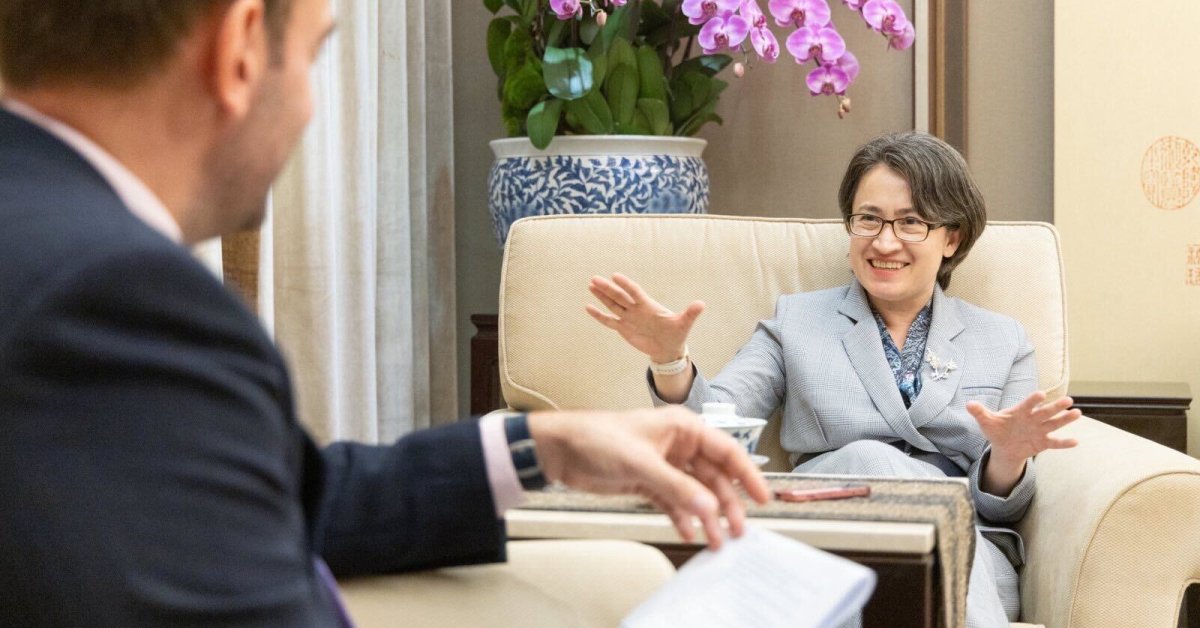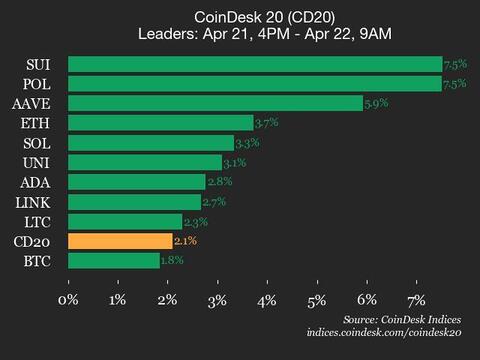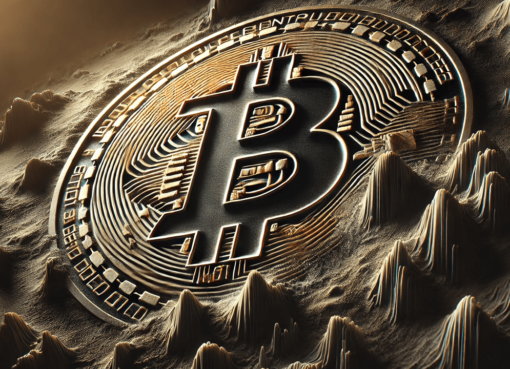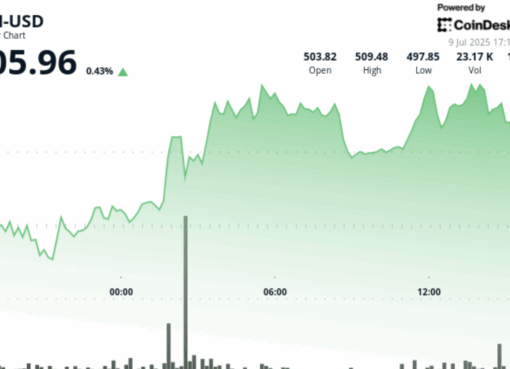Most kids dream of becoming an astronaut, firefighter, or professional ice-cream taster. Not Hsiao Bi-khim. She began training in international diplomacy at just three years old. “As soon as I could talk, I would translate between my Taiwanese grandmother and my American grandmother,” Hsiao tells TIME in her first official interview as Taiwan’s new Vice President. “I grew up knowing that, in some way, I would play a role as a bridge between the Taiwanese and American people.”
From 2020 until last November, Hsiao, 52, did exactly that, serving as Taiwan’s de facto ambassador to the U.S. Although Washington and Taipei severed official relations when the U.S. recognized Mao Zedong’s People’s Republic (PRC) in 1979, the two governments have maintained a bevy of informal ties. Over three years, despite pandemic lockdowns rendering engagements extremely tricky, Hsiao can point to several achievements, such as becoming the first Taiwanese official since 1979 to attend a U.S. presidential inauguration when she attended Joe Biden’s.
Then there is last year’s U.S.-Taiwan Initiative on 21st Century Trade, which covers general principles related to customs and border procedures, regulatory practices and anti-corruption practices. Hsiao hopes a second and third batch of the agreement include tariff reductions or exemptions to boost bilateral trade in goods and services, which totaled some $160 billion in 2022. “We want to be open to the world and thrive on international trade and businesses,” says Hsiao.
It’s success that prompted new Taiwan President Lai Ching-te to tap Hsiao to be his running mate in January’s election, which heralded an unprecedented third straight term for the China-skeptic Democrat Progressive Party (DPP). Speaking on the fourth floor of Taipei’s red-and-white-brick Presidential Office Building, where Hsiao began her new role on May 20, she admits she’s “still adjusting” to life back in Taiwan and to mixed feelings about leaving the U.S. with so much work left to do.
“There are certainly still many unfinished projects,” she says, citing her goal of finally sealing a double taxation agreement. “I would have liked to continue to contribute to the relationship. But, of course, other duties also demand my presence.”
Still, it will be a continuation of sorts. Under pressure from Beijing, which considers self-ruling Taiwan its sovereign territory, the island has become increasingly isolated diplomatically. Today, Taiwan has just 12 diplomatic allies, down from 22 when former President Tsai Ing-wen took office in 2016, and 56 when the Republic of China—the Taipei government’s official title—lost recognition in the U.N. to the PRC in 1971. As such, ties with the U.S., which is not among Taiwan’s diplomatic allies but maintains a robust unofficial bilateral relationship, have taken on newfound importance and Hsiao is perfectly placed to ensure those links remain strong.
“With Bi-khim’s support, we will engage in more substantive cooperation on national security and defense, the economy, and other exchanges,” Lai told TIME in his first interview as President. “I trust that we will make much progress as Bi-khim has been instrumental in bridging Taiwan together with the U.S.”
Few are better placed to bridge the two countries than Hsiao. She grew up in Taiwan’s southern city of Tainan though in her teens moved with her family to northern New Jersey, where she attended Montclair High School before earning degrees at Oberlin College and Columbia University. In a chapter he contributed to Hsiao’s 2004 autobiography, Hsiao’s father recalls how his daughter shunned popular cliques and befriended minority kids, once bringing 17 stray souls from as far away as Bangladesh to the family home over the Christmas holidays, and even advocated on behalf of one Asian student who was being harassed in class. “Tolerance of different opinions does not diminish [Hsiao’s] sense of right and wrong or justice,” he wrote.
While her mother boasts traces of Scottish, English, and Dutch ancestry, Hsiao is fiercely proud of her Taiwanese identity, choosing to be known by the Taiwanese rather than the mandarin spelling of her first name or her Western middle name, Louise. Moreover, her soft East Coast lilt and disarming humor stands in stark contrast to the strident “wolf warrior” diplomacy China exhibits under strongman Xi Jinping. Hsiao has striven to amplify the contrast, describing herself as a “cat warrior” given she arrived in Washington with four feline companions. It’s a charm offensive that has won fans on both sides of America’s hyper-polarized political divide.
American backing was on full show at Lai and Hsiao’s May inauguration, where the 51 international delegations included several former U.S. officials. But as November’s election approaches in the U.S., the status of Taiwan risks becoming a cudgel for opportunistic politicians of all stripes. Already, it appears a selfie in Taipei is requisite for any aspiring lawmaker seeking to trumpet their tough-on-China chops. “If you get a Trump presidency, or a Biden presidency with a Republican Congress, moving Hsiao to the presidential office makes sense because she has very good ties across the aisle in Washington,” says Chong Ja Ian, an expert on Taiwan politics at the National University of Singapore.
Still, being the U.S. foreign policy cause célèbre naturally begets an element of risk. The inauguration last month was also attended by former U.S. Secretary of State Mike Pompeo, who previously suggested that the U.S. should formally recognize Taiwan—a proposition that would radically alter the delicate status quo regarding the island’s status and cross a “red line” for Beijing. “We cannot afford to be caught up in partisan differences,” admits Hsiao. “So we are working with both sides of the political aisle … to ensure that support for Taiwan is strong, it’s firm, it’s consistent, it’s predictable.”
Aside from the manner of her diplomacy, Hsiao’s new post reaffirms the stark differences between Taiwan and PRC governance. Last year, Xi revealed an all-male politburo with no women in the party’s leadership committee for the first time since 1997. Following two terms of the outgoing Tsai, who in 2016 become both Taiwan’s first female leader as well as the first in Asia not to follow in the footsteps of a male relative, Hsiao’s role as Vice President spotlights Taiwan’s commitment to diversity in the corridors of power—not least given she is mixed race at a time when the CCP is increasingly dominated by a resurgent Han chauvinism.
“Ultimately, in Taiwan we want our democracy to be strong,” says Hsiao, who previously served as a lawmaker representing Hualien County in eastern Taiwan. “And we would like to see our friends’ democracies strong and functioning as well.”
A self-professed “Jersey girl,” Hsiao was especially proud that on May 29 the Garden State chose Taiwan to host its new Asia Pacific center to expand regional economic and cultural ties. In a statement, New Jersey Governor Phil Murphy hailed “this pivotal step,” which would “evolve into unprecedented realms of opportunity, collaboration, economic prosperity, and cultural enrichment.”
It’s just one of a network of new bonds that are helping to strengthen Taiwan’s place in the world, which is under constant assault from Beijing. Taiwan was only partly controlled by China’s Qing Dynasty and from 1895 to 1945 was ruled as a Japanese colony. But after Generalissimo Chiang Kai-shek’s routed Nationalists fled to the island in 1949, the CCP became fixated on “reuniting” its wayward province with the PRC, despite Taiwan never having been under its control.

Other than diplomatically isolating Taiwan, the PRC has set about using coercive measures such as disinformation campaigns and trade embargos to put pressure on its 23 million people. According to a recent tally by The Economist, at least 28 nations have voiced support for Beijing’s claim over Taiwan. Following Russia’s invasion of Ukraine, many nations amongst the Global South shocked their developed peers by parroting Vladimir Putin’s specious justifications regarding NATO expansionism. For Hsiao and all of Taiwan, the impetus is to win the argument regarding the island’s right to self-determination in the court of global opinion to help stave off any potential conflict.
“We’re always concerned about China’s provocations,” says Hsiao. But “we will be the responsible side, maintaining the status quo of peace and stability.”
Stability in the Taiwan Strait is an increasing concern across the Asia-Pacific, whose U.S. aligned democracies are boosting military and economic ties. Despite spending her formative years in Taiwan and the U.S., Hsiao was actually born in Kobe, Japan, which adds another “dimension to my personal interest in making friends across borders,” she says. Last month, Japanese Prime Minister Fumio Kishida visited a new chip factory operated in Japan by Taiwanese semiconductor giant TSMC with investment from local stalwarts like Sony, Denso, and Toyota.
China’s increasingly aggressive regional posture has also boosted sympathy for Taiwan. In March last year, outgoing Micronesia President David Panuelo accused China of engaging in “bribery, psychological warfare, and blackmail” in the Pacific in an explosive 13-page letter that called for ending diplomatic ties with Beijing, which he accused of preparing to invade Taiwan. Beijing dismissed the letter as “smears and accusations.” Speaking to the Shangri La Security Dialogue in Singapore on May 31, Philippine President Ferdinand ‘Bongbong’ Marcos Jr. scolded China for aggression in the disputed South China Sea, while highlighting his nation’s “fraternal bonds with the people on both sides of the Taiwan Strait.”
Indeed, Taiwan is also building bonds beyond the Asia-Pacific, helped in part by good press generated by the COVID-19 pandemic. When Taiwan on Dec. 31, 2020, tried to alert the World Health Organization (WHO) to a mysterious pneumonia in China’s city of Wuhan, its email was ignored. China, meanwhile, has been accused by the same body of withholding information regarding the pandemic’s origins. To this day, Chinese pressure keeps Taiwan from joining the WHO even as an observer, despite allowing it to do so from 2009 to 2016 under a previous pro-China administration in Taipei. Even in international sporting events like the Olympics, Chinese pressure means Taiwan can only compete under the deeply unsatisfactory name, “Chinese Taipei.”
“Taiwanese people resent being isolated and deprived of the opportunity to be a good citizen in the world,” says Hsiao. “There are many burdens on our shoulders, but we will stride forward with confidence.”

Last year, German Education Minister Bettina Stark-Watzinger became the first cabinet member from Europe’s biggest economy to visit Taiwan in 26 years. Her visit, which took place despite Beijing’s protests, was designed to enhance science and technological cooperation. In 2021, an exchange with NATO saw a Taiwan lieutenant colonel dispatched on a six-month academic training program at an international military college in Rome, Italy.
Support has been especially pronounced amongst former Soviet satellites. After Taiwan and Lithuania agreed in 2021 to open reciprocal representative offices, Beijing responded by downgrading diplomatic relations with Vilnius, suspending direct freight rail services, and imposing a trade embargo. Yet such bullying has only galvanized support for Taiwan amongst like-minded democracies, not least since the invasion of Ukraine, which served as “a wakeup call to many that we cannot take peace for granted,” says Hsiao.
“Eastern European countries are especially sympathetic because of their experience living with a much larger and aggressive neighbor,” she adds. “Their persistent struggle to maintain and develop their democracy, to defend their freedoms … [engenders] a natural sympathy for the people of Taiwan and where we are in the world today.”
For Hsiao personally, that is now back in Taipei, where her life as an elected official has sadly curtailed many international engagements. According to established protocols, elected Taiwan officials are only permitted to visit the U.S. on transit to its dwindling pool of diplomatic allies. So when, in March, Hsiao returned to Washington in a personal capacity to pack up her belongings and tie up other loose ends, Beijing hit out that it opposed any visit by Hsiao “in any name or under whatever pretext” to the U.S. Given the hobnobbing essential to her previous role, and that her mom still lives in America, the fact that even family reunions are now geopolitical footballs will take some getting used to.
“When I was in DC, I could engage with many peers across the board and have interaction and feedback and an understanding of what’s happening in the world,” says Hsiao. “We’ve all been through a period of personal isolation during COVID-19 and can appreciate the need for interpersonal engagements. So that is very different 1718280977. And that is in part why we always welcome visitors to Taiwan.”




